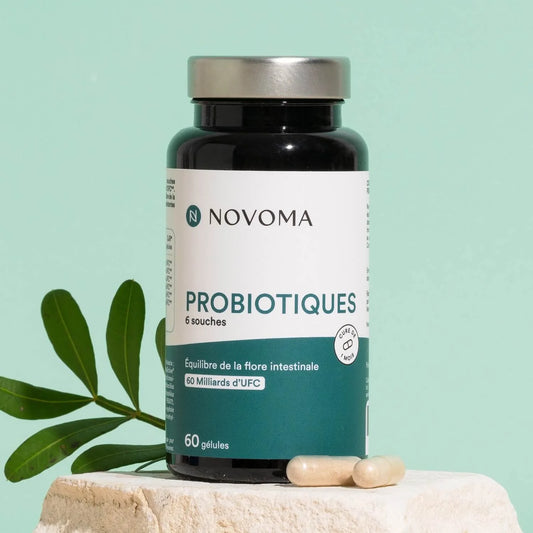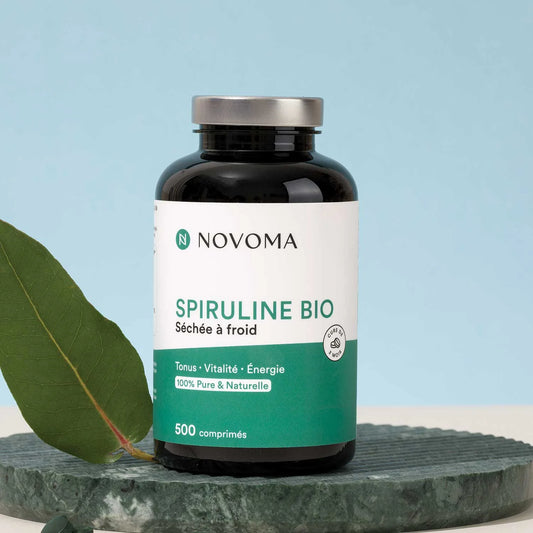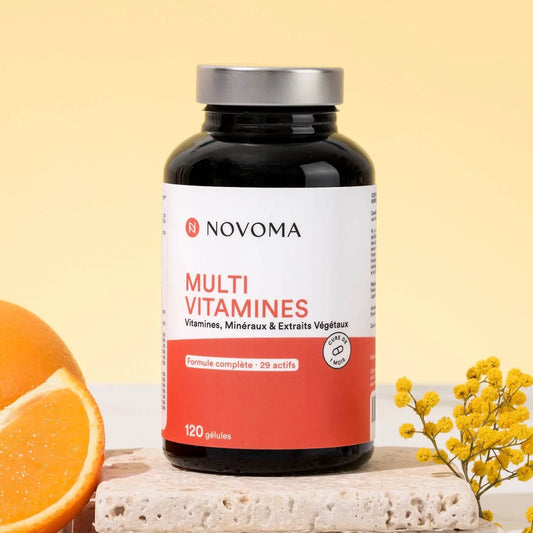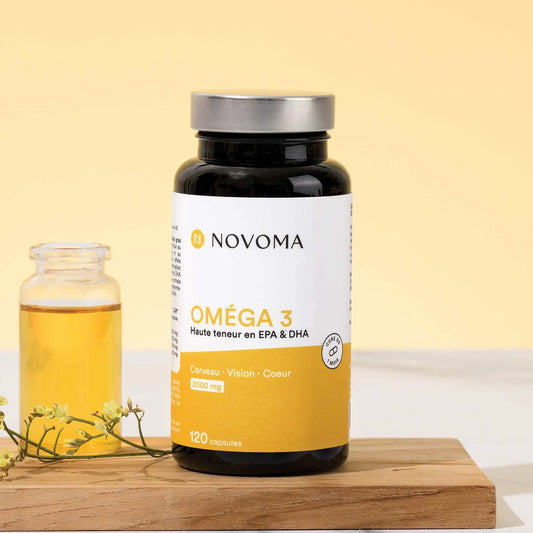
The 10 best foods good for the intestines!
The intestinal flora plays a fundamental role in our well-being. Today we explore what the intestines are, what intestinal flora consists of, and how to take care of it with a balanced diet. And because health also comes from our plates, we present to you 10 foods that are good for the intestines .
Ready to dive into the fascinating world of your gut microbiota? Let's go !

Let's start at the beginning: what is intestinal flora?
Role of intestinal flora 🦠
The gut flora, also known as the gut microbiota , is a complex community of microorganisms that reside in our digestive tract. It is involved in digestion, the absorption of nutrients, and it even contributes to the functionality of our immune system. In other words, healthy intestinal flora rhymes with maximum well-being! 💪
Composition of the intestinal flora
The microbiota is made up of billions of bacteria, yeasts and viruses. Each person has a unique intestinal flora , influenced by genetics, diet and lifestyle.
What are the essential needs of the microbiota?
Balance of intestinal flora 🔄
Intestinal balance, in concrete terms, is when everything is going well!
Microorganisms act in the intestine by protecting our body from pathogens while ensuring good transit. But certain factors can alter this functioning.
Don't panic, we'll tell you about it in this article . Because yes, the intestinal flora has its own needs to remain balanced.
Need #1: Probiotics
Probiotics are live microorganisms that consist primarily of various strains of bacteria, such as bifidobacteria , lactobacilli , lactococci , as well as yeasts like saccharomycetes .
Their incorporation into our diet improves the composition of our intestinal microbiota, by renewing the fleet of good bacteria in the intestine.
Need #2: prebiotics and other dietary fibers
Prebiotics are molecules indigestible by the human body that serve as food for good bacteria. They promote the growth and activity of probiotics, thus contributing to healthy intestinal flora. Prebiotics are mainly dietary fibers found in grains, fruits and vegetables.
Factors that affect the intestinal flora
From time to time, certain situations negatively affect the intestinal flora. As each human being has its own microbiota, everyone is more or less sensitive to these imbalance factors. However, we can generalize:
Diet influences the quality of the intestinal flora. A diet too rich in fats as well as alcohol consumption impairs normal functioning.
Stress also has a negative effect on our intestines.
Antibiotics kill not only harmful bacteria, but also good bacteria in the intestine, unfortunately indiscriminately.
Certain gastrointestinal disorders can disrupt the intestinal flora.
How does the intestine work?
Understanding your gut
When the intestine is not able to function normally, our entire well-being suffers. Who feels good when their stomach hurts?
Because that’s what it’s all about. A disruption of the intestinal flora can lead to stomach aches, bloating, digestive discomfort, blocked or, conversely, excessively accelerated transit.
Nothing very happy...
Unfortunately, we are not all in the same boat and some of us are more sensitive (yes, we are still talking about the intestines!). If you have a reactive gut, it may be more affected by the factors discussed above.
We recommend you
Probio Formula
Synergistic formula of 6 patented natural probiotic strains SynBalance®.
- ✅ Synergy of 6 patented microbiotic strains
- ✅ 60 Billion CFU per dose
- ✅ Prolonged effectiveness
- ✅ DRcaps® gastro-resistant capsules
What can make the gut reactive?
The reactive intestine is firstly disturbances in intestinal motility, which leads to either an acceleration or a slowdown of intestinal transit. An irritated intestine is more sensitive to external disturbances, so this is a source of daily discomfort.
Foods to avoid to relieve it ❌
When discomfort occurs daily, it is first a good idea to consult a doctor, but also to adapt your diet to relieve yourself.
According to health insurance, hyper-processed foods containing synthetic sweeteners should be avoided.
But also foods rich in FODMAPs. Under this barbaric name hides an acronym for “ Fermentable Oligo-, Di-, and Monosaccharides, And Polyols ”. These are compounds that are difficult to digest and complicate the work of the already weakened intestine.
Among them, we find: lactose, wheat (and that means bread and pasta), cruciferous vegetables (cabbage, asparagus, leek, among others) and also chewing gum. Although these are not meant to be swallowed, chewing without filling the digestive tract stimulates the intestine into action and filling with air.
10 foods good for the intestines
Once we've sorted through the cupboards and removed anything that hurts our stomach. What do we eat when our gut is sensitive?
Here is the list of foods good for the intestines to note on your shopping list.
Of course, these are not miracle solutions, but rather advice to adapt to your daily life!

Red fruits 🍓
Red fruits can be used and abused because they contain a good amount of polyphenol and fiber. The first is an effective antioxidant and the second is beneficial to intestinal transit.
The banana 🍌
A natural source of prebiotics, it nourishes the good bacteria in your intestine. Banana is also easy to digest.

Yogurt 🥄
The probiotics found in yogurt help the intestines digest lactose. The intake of probiotics restores the intestinal flora.
Fermented foods
Kefir and other fermented foods are rich in probiotics. Moral, in the case of an irritated colon: it is better to enjoy sauerkraut than a Lorraine stew.
Cheese 🧀
Hard cheeses are the most digestible. They are beneficial for the intestines, because they contain essential amino acids as well as a significant dose of probiotics.
Garlic 🧄
Garlic has the same virtues as red fruits: rich in antioxidants and fiber.

Spices 🌶️
To reduce gas and bloating, season with carminative spices (which facilitate the evacuation of intestinal gas). Among them, we find:
cumin;
-
fennel ;
coriander ;
ginger ;
but also parsley;
dill;
and mustard.
Oats 🌾
Easier to digest than wheat, but also rich in fiber, oats are a food good for our intestines.
The pear 🍐
The pear is rich in water and very digestible. It has a slight laxative effect. It naturally fights against constipation thanks to soft fibers.

Flax seeds 🌰
Flaxseeds contain fiber and omega-3 fatty acids, supporting healthy digestion.
What about supplementation?
We recommend you
Probio Formula
Synergistic formula of 6 patented natural probiotic strains SynBalance®.
- ✅ Synergy of 6 patented microbiotic strains
- ✅ 60 Billion CFU per dose
- ✅ Prolonged effectiveness
- ✅ DRcaps® gastro-resistant capsules
Depending on your culinary tastes and/or your diet, it is not always possible to incorporate all these foods that are good for the intestines into your menus.
Food supplements are then a solution to restore the intestinal flora.
For a supply of high quality probiotics, we recommend our Probio Formula .
The improvement in digestive comfort is visible from 10 days thanks to a compound of 6 microbiotic strains encapsulated in gastro-resistant vegan capsules.
Because we are always looking for the best for our well-being, our probiotics are guaranteed without additives and made in France. 🇫🇷
A great smoothie recipe with foods good for the intestines
It's all well and good to have a list of ingredients, but what can you do with them? Taking care of your intestines should be fun, right?
Today, we offer you a digestive smoothie with fruits and probiotics.
Ideal for breakfast or for a 4 p.m. snack.
Grab a blender and let's go!
To make this smoothie, you will need:
150 g of red fruits. It can be a frozen mixture of strawberries, raspberries and blueberries;
120 g of probiotic yogurt;
120 ml of almond milk;
1 tsp of honey;
-
A few ice cubes.
Blend on high speed until the mixture is smooth and creamy. If the smoothie is too thick, add a little milk until you reach the desired consistency.
Enjoy it immediately to enjoy its freshness. Enjoy your food !
To conclude
You now know how a balanced diet helps to soothe and pamper your intestines. By carefully incorporating gut-friendly foods into your menus, you can support healthy gut flora.
In conclusion, this article has guided us through a taste and nutritional journey aimed at improving the comfort of our intestines. Gut irritation can be a source of discomfort, but there are natural ways to promote intestinal well-being.
We have discovered that foods rich in probiotics, such as yogurt, kefir and sauerkraut, are valuable allies in nourishing our beneficial gut bacteria. These bacteria play a major role in digestion, nutrient absorption and maintaining our intestinal balance.
Foods rich in fiber, such as lentils, wholemeal bread and red fruits, also help to maintain healthy intestinal flora and prevent intestinal irritation. Additionally, polyphenols found in foods such as dark chocolate provide additional protection for our intestinal well-being.
By following these tips for a weak gut diet and incorporating these foods into your diet, you can provide essential support to your digestive system . Taking care of your gut can have a positive impact on your overall well-being.
Remember that your diet plays a key role in promoting healthy digestion and balanced intestinal flora. So, explore these delicious options and make good choices to pamper your intestines and promote better intestinal comfort. Your body will thank you, and you will be able to enjoy life without inconveniences.
Taking care of your intestines means taking care of your overall well-being. So, make each meal an opportunity to nourish your microbiota to feel better every day. Good digestive balance to everyone! 🌟




























